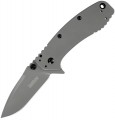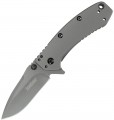Blade length
The total length of the knife blade. This characteristic is one of the most important, with several practical points associated with it.
Firstly, the length of the blade is directly determined by the purpose of the product, and even within the same type (see above) there may be different options. For example, hunting knives for skinning (skinners) are usually quite short, up to 10 cm - in contrast to general-purpose options. Therefore, it is worth choosing a model according to this parameter, taking into account the work for which you plan to use the knife.
Secondly, the dimensions of the blade determine the overall dimensions of the knife itself. This is especially important for outdoor models (see "Type"): although the knife is usually worn folded, it is customary to indicate its dimensions in the specifications for the unfolded position. And by the length of the blade, you can quite clearly estimate the length of the knife when folded: usually it is 1.5 - 1.7 times longer than that of the blade itself, and in any case, the knife cannot be shorter than its own blade.
Thirdly, the length of the blade can be (and in many CIS countries is) one of the criteria for determining whether a knife belongs to a cold weapon. Usually, regulatory documents indicate a certain minimum length value: shorter blades do not fall into the category of edged weapons, regardless of their design, and for longer blades, specific evaluation criteria come into force...(hardness of the material, shape of the point, blade thickness, etc.).
At the same time, it should be borne in mind that the length of the blade can be measured in different ways: from the point to the beginning of the handle, from the point to the peg used in opening, etc. In practical application, this moment does not play a decisive role, however, it can create legal problems: for example, state examination methods may not take into account the peg. So, if you have doubts about this, it is best to purchase a knife that has an official certificate that this model is not a melee weapon.
Weight
The total weight of the knife. It is worth evaluating this indicator depending on the type (see above) and purpose: for example, for a compact hiking model,
light weight is usually a virtue, among hunting and fishing it all depends on specialization, and a machete, by definition, must be
weighty — otherwise, cut with such a blade it will just be uncomfortable.

